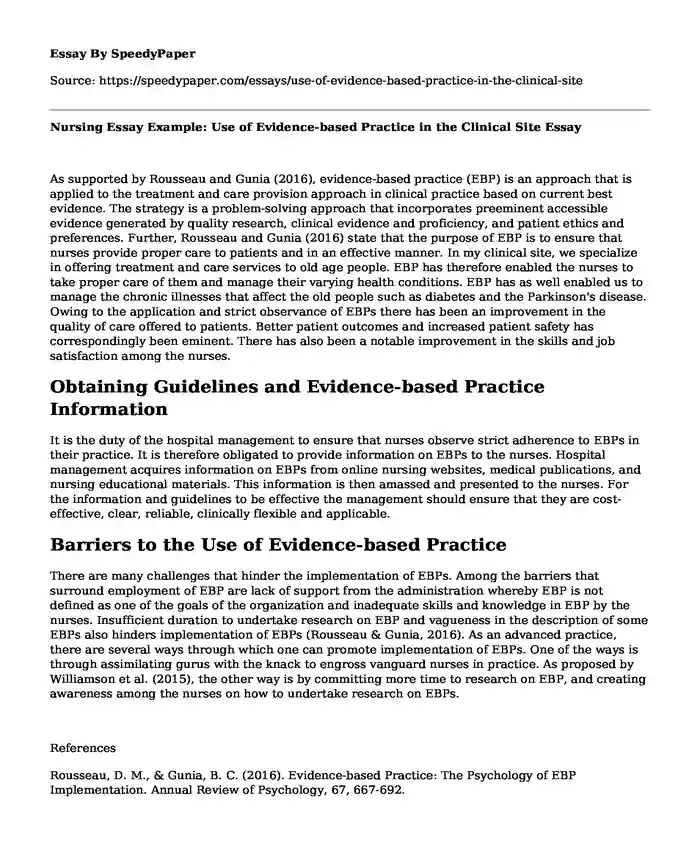
| Type of paper: | Course work |
| Categories: | Nursing care |
| Pages: | 2 |
| Wordcount: | 469 words |
As supported by Rousseau and Gunia (2016), evidence-based practice (EBP) is an approach that is applied to the treatment and care provision approach in clinical practice based on current best evidence. The strategy is a problem-solving approach that incorporates preeminent accessible evidence generated by quality research, clinical evidence and proficiency, and patient ethics and preferences. Further, Rousseau and Gunia (2016) state that the purpose of EBP is to ensure that nurses provide proper care to patients and in an effective manner. In my clinical site, we specialize in offering treatment and care services to old age people. EBP has therefore enabled the nurses to take proper care of them and manage their varying health conditions. EBP has as well enabled us to manage the chronic illnesses that affect the old people such as diabetes and the Parkinson's disease. Owing to the application and strict observance of EBPs there has been an improvement in the quality of care offered to patients. Better patient outcomes and increased patient safety has correspondingly been eminent. There has also been a notable improvement in the skills and job satisfaction among the nurses.
Obtaining Guidelines and Evidence-based Practice Information
It is the duty of the hospital management to ensure that nurses observe strict adherence to EBPs in their practice. It is therefore obligated to provide information on EBPs to the nurses. Hospital management acquires information on EBPs from online nursing websites, medical publications, and nursing educational materials. This information is then amassed and presented to the nurses. For the information and guidelines to be effective the management should ensure that they are cost-effective, clear, reliable, clinically flexible and applicable.
Barriers to the Use of Evidence-based Practice
There are many challenges that hinder the implementation of EBPs. Among the barriers that surround employment of EBP are lack of support from the administration whereby EBP is not defined as one of the goals of the organization and inadequate skills and knowledge in EBP by the nurses. Insufficient duration to undertake research on EBP and vagueness in the description of some EBPs also hinders implementation of EBPs (Rousseau & Gunia, 2016). As an advanced practice, there are several ways through which one can promote implementation of EBPs. One of the ways is through assimilating gurus with the knack to engross vanguard nurses in practice. As proposed by Williamson et al. (2015), the other way is by committing more time to research on EBP, and creating awareness among the nurses on how to undertake research on EBPs.
References
Rousseau, D. M., & Gunia, B. C. (2016). Evidence-based Practice: The Psychology of EBP Implementation. Annual Review of Psychology, 67, 667-692.
Williamson, K. M., Almaskari, M., Lester, Z., & Maguire, D. (2015). Utilization of Evidence-based Practice Knowledge, Attitude, and Skill of Clinical Nurses in the Planning of Professional Development Programming. Journal for Nurses in Professional Development, 31(2), 73-80.
Cite this page
Nursing Essay Example: Use of Evidence-based Practice in the Clinical Site. (2022, Apr 14). Retrieved from https://speedypaper.net/essays/use-of-evidence-based-practice-in-the-clinical-site
Request Removal
If you are the original author of this essay and no longer wish to have it published on the SpeedyPaper website, please click below to request its removal:
- Free Essay on The Oak Ridges Moraine
- Kentucky Fried Chicken (KFC) in Saudi Arabia - Free Essay Example
- Essay Example on the Implementation of Electronic Health Records
- Essay Sample Describing the Case Study of Vauban: Car-Free Suburb
- Free Essay on Union in Peril: The Crisis over British Intervention in the Civil War by Howard Jones
- Fundamentalist and Radical Approaches to Religion, Essay Sample at No Charge
- Essay Sample on Reusing Energy from Elevators
Popular categories




